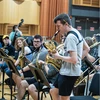Amanda Pruden, a junior Women's and Gender Studies major, will explore how alternative family living arrangements are depicted in children’s literature on Wednesday, Dec. 4, at 5 p.m., at Room G103B Williams Center. Her presentation, which is a project for the class, Women's and Gender Studies Special Topics, will look at the wide disparity between children’s books depicting non-nuclear families compared to nuclear or traditional families.
The program will also include a creative writing workshop and presentation to identify ideas currently found in children’s literature, the problems that result when these ideas are the only representations of families and gender, and books now available that showcase non-traditional family structures and break gender stereotypes.
Participants will be able to share ideas that they would like to see in children’s literature and then discuss how to make gender and family structure ideas understandable to a child. The program is free and open to the public.
“One thing that I’ve always been interested in is how early on things like the social construction of gender and the idea of a family having to look a certain way in order to be ‘ideal’ are learned by children,” Pruden said. She cites the nuclear family – a mother, father and children – as being seen as the norm of society. “This idea is reinforced through children’s literature and in virtually every part of their upbringing. However, many families don’t look exactly like that ‘ideal’ nuclear family,” Pruden explained.
Children can grow up with their grandparents, with a single father or two mothers. “The problem is that without the recognition of these family structures that exist within our society, children grow up believing that they are somehow missing something, that their family is somehow ‘wrong’ or ‘broken,’ even in the presence of a loving and caring household that just may look at little different.”
Gender binary is also taught through expectations and norms of how society should observe gender beginning in infancy to continuing into adulthood. For example, children are steered away from toys or clothes that were intended for the opposite gender.



